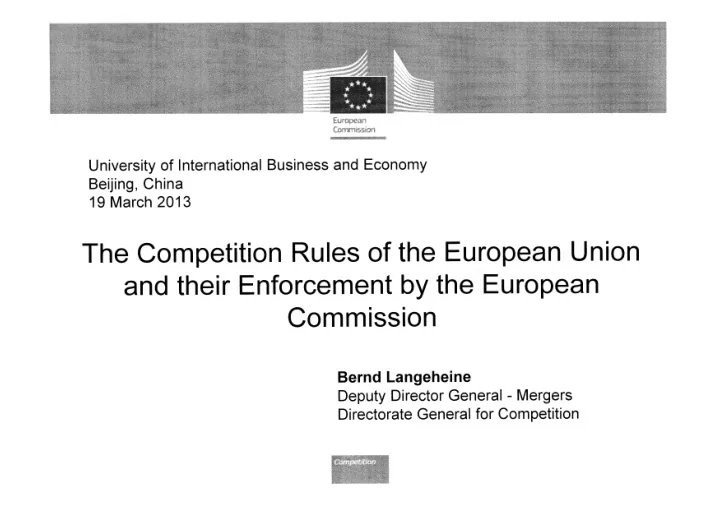

University of International Business and Economy Beijing, China 19 March 2013 The Competition Rules of the European Union and their Enforcement by the European Commission Bernd Langeheine - Mergers Deputy Director General Directorate General for Competition
o m p e t i t i o n Law The Three Pilars of EU C Control Merger Control S t a t e Aid A n t i t r u s t policy P r e v e n t i o n o f u n d u e Safeguarding m a r k e t Control of behaviour e State subsidisation b y t h structure of c o m p a n i e s Restrictive Art 107-1 0 9 TFEU Reg. 139/2004 (Cartels) agreements Art 101 T F E U a l L 2 4 o f Offical J o u r n 1 2 9 J a n u a r y 2 0 0 4 , Abuse o f m a r k e t P. power Art 102 T F E U t e r a l _ c o n d u c t ) ( u n i l a
Restrictive agreements (Art. 101) By effect By object • case-by-case assessment illegal in themselves and invariably harmful • positive effects can outweigh restrictive effects to competition • depends on the nature of • “per Se” illegal object, the agreement and market no need to examine conditions effects, price • exemption requires proof cartels on eg. of efficiencies or other fixing or market sharing consumer benefits
hp( fl (cr Hard Core Cartels Most serious attack on fair and undistorted competition: > Price fixing technical or controlling production, markets, > Limiting developments or investment > Dividing up markets or sources of supply. Example: Cartel among producers of LCD panels. I—
‘ Abuse of dominance(Art 102) Dominance: the ability to behave independently from customers and competitors Abuse examples: U Charging excessive prices . Charging unfair low prices Discriminating between trading partners S . Certain forms of bundling & tying Unfair loyalty rebates . Examples: - Intel case (2009) > Microsoft case (2004) f
_ _ — m V V V 0> >< I c< —‘< 3 DuCD D .1 0 D ØCDDCD DOD -‘ CD C, II C, F-’ 30 Cl) —.-c: 3 -, CD ?5CD O(QCD D (1) F —*O I. -‘ D C .1 CD 0 D -, .1 0 0 3 0 _,CI) Q) C-) .1 0 CD 0 CD 0 3D -‘
I Reform (2004) From a centralised enforcement system to a decentralised application of EU competition rules the 27 EU for cooperation between Creation of a forum European Commission: the and Member States (ECN) Competition Network > Efficient division of work > Effective enforcement of EU competition rules Further cooperation
Merger Control (Regulation 13912004) • Ensure that mergers that would harm competition are blocked or modified (by commitments) effective impede “significantly may mergers or strengthening a competition”, often by creating further tightening a dominant player but also by narrow oligolpoly. Mergers can be good for competition egg. cost savings; efficiency gains in innovation; R&D Market players can become more competitive and consumers can benefit from higher-quality goods at fairer prices
Merger E v a l u a t i o n effects- EU Merger control increasingly applies an based approach (meaning greater emphasis on “economics” and less reliance structural factors on as concentration s u c h levels o market s h a r r e s ) Typical e l e examined m e n t s to be >Are the products of the merging parties c l o s e substitutes? other companies quickly ona > Could enter and compensate sufficient scale to for th el oss of competition the merger ( c r e a t of a new by i o n “competitive c o n s t r a i n t ” )
L__ Prohibitions are the exception Only 24 prohibitions in some 4600 merger reviews since 1990. But over 300 mergers only cleared subject to conditions (remedies) Recent examples: > Financial services:Deutsche BOrse/NYSE Euronext > Airlines: Ryanair/Aer Lingus Logistical services: UPS/TNT Remedies: a proportionate solution for competition problems (normally through a structural measure, such as a divestment of assets) Examples: > Panasonic/Sanyo Cisco/Tandberg > Western Diaitl/Hitachi
Competition Authorities - Enforcement > Effective enforcement procedures > Efficient structures > Adequate resources > Independent decision-making Focus on competition policy considerations > Transparency and procedural rights
enforcement and cooperation I n t e r n a t i o n a l cases concern of c o m p e t i t i o n increasing number An n a t i o or global w i d e r than n a l w h i c h a r e markets Canada, cartel (2010) included La. Air > A i r t r a n s p o r t Singapore Airlines, Pacific, British Airways, Cathay Airlines Japan t e r of benefits in m s International cooperation — convergence credibility and coherence, EU Commission and C h i n e s e b e t w e e n Cooperation — MoUs with Mofcom, NDRC authorities competition and SAIC
Recommend
More recommend